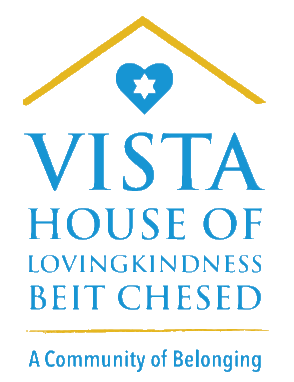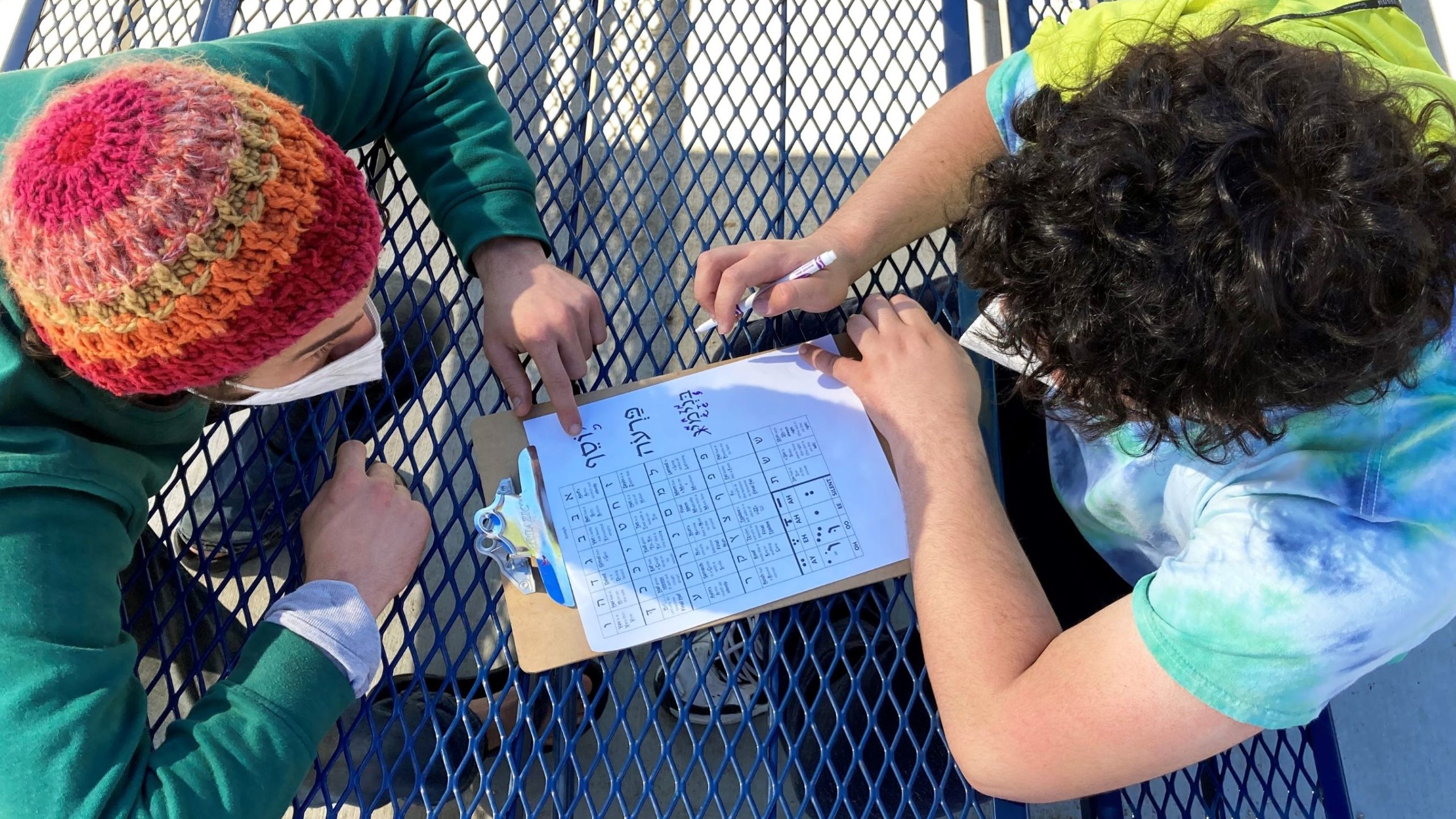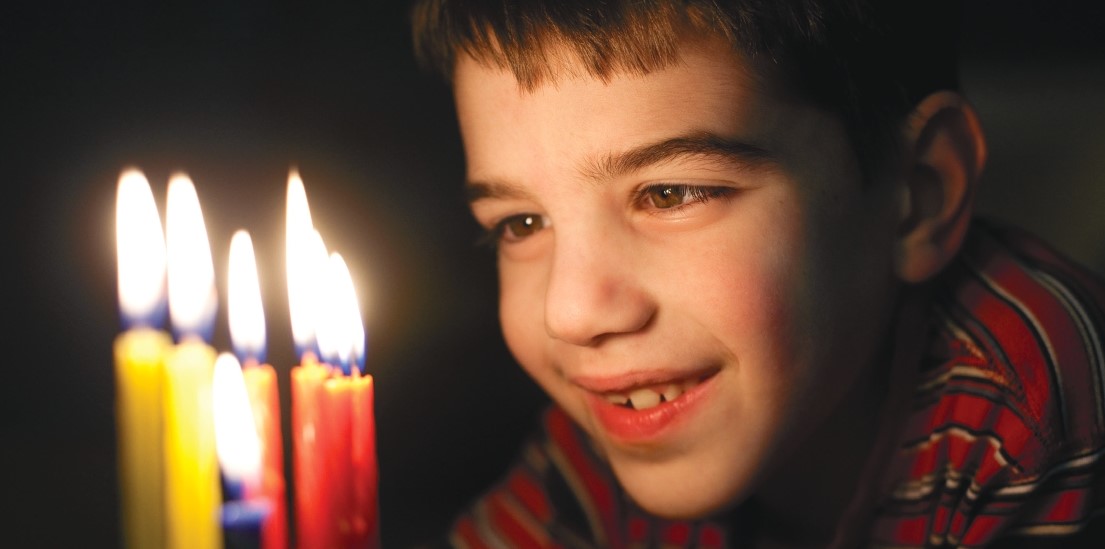












They shall sit each one under their own vine and fig tree and none shall make them afraid.
Micha 4:4
Inclusive High Holiday Services at Vista Del Mar Child and Family Services
Vista House of Lovingkindness – Beit Chesed welcomes individuals and families from walks of Jewish life...



They shall sit each one under their own vine and fig tree and none shall make them afraid.
Micha 4:4
Inclusive High Holiday Services at Vista Del Mar Child and Family Services
Vista House of Lovingkindness – Beit Chesed welcomes individuals and families from walks of Jewish life...



They shall sit each one under their own vine and fig tree and none shall make them afraid.
Micha 4:4
Inclusive High Holiday Services at Vista Del Mar Child and Family Services
Vista House of Lovingkindness – Beit Chesed welcomes individuals and families from walks of Jewish life...



A Monthly Virtual Shabbat Gathering presented by Vista House of Lovingkindness
For the Entire Community! All are Welcome!
Please join us as we welcome Shabbat!



A Monthly Virtual Shabbat Gathering presented by Vista House of Lovingkindness
For the Entire Community! All are Welcome!
Please join us as we welcome Shabbat!



Vista House of Lovingkindness - Beit Chesed presents Havdalah Culmination
Family and friends welcome!
Details coming soon!



Cutting edge, multi-sensory Jewish learning program designed for students with autism and other neurodiverse abilities.
A sacred space in which to explore and experience Jewish Life in an atmosphere which is safe, nurturing, and joyous. Deep learning is creatively infused with music, art, movement, and friendship, to provide a truly accessible Jewish Education with Jewish Experiences for our students.
- Jewish Studies include individualized learning for those preparing for B’nei Mitzvah.



Currently in Session
Cutting edge, multi-sensory Jewish learning program designed for students with autism and other neurodiverse abilities.
A sacred space in which to explore and experience Jewish Life in an atmosphere which is safe, nurturing, and joyous. Deep learning is creatively infused with music, art, movement, and friendship, to provide a truly accessible Jewish Education with Jewish Experiences for our students.
- Jewish Studies include individualized learning for those preparing for B’nei Mitzvah.



Currently in Session
Cutting edge, multi-sensory Jewish learning program designed for students with autism and other neurodiverse abilities.
A sacred space in which to explore and experience Jewish Life in an atmosphere which is safe, nurturing, and joyous. Deep learning is creatively infused with music, art, movement, and friendship, to provide a truly accessible Jewish Education with Jewish Experiences for our students.
- Jewish Studies include individualized learning for those preparing for B’nei Mitzvah.
- Live Interactive virtual option available for all classes.



A Monthly Virtual Shabbat Gathering presented by Vista House of Lovingkindness
For the Entire Community! All are Welcome!
Please join us as we welcome Shabbat!



Currently in Session
Cutting edge, multi-sensory Jewish learning program designed for students with autism and other neurodiverse abilities.
A sacred space in which to explore and experience Jewish Life in an atmosphere which is safe, nurturing, and joyous. Deep learning is creatively infused with music, art, movement, and friendship, to provide a truly accessible Jewish Education with Jewish Experiences for our students.
- Jewish Studies include individualized learning for those preparing for B’nei Mitzvah.



Holocaust Remembrance / Israel Memorial Day / Israel Independence Day Ceremonies
Details coming soon!



Currently in Session
Cutting edge, multi-sensory Jewish learning program designed for students with autism and other neurodiverse abilities.
A sacred space in which to explore and experience Jewish Life in an atmosphere which is safe, nurturing, and joyous. Deep learning is creatively infused with music, art, movement, and friendship, to provide a truly accessible Jewish Education with Jewish Experiences for our students.
- Jewish Studies include individualized learning for those preparing for B’nei Mitzvah.



Currently in Session
Cutting edge, multi-sensory Jewish learning program designed for students with autism and other neurodiverse abilities.
A sacred space in which to explore and experience Jewish Life in an atmosphere which is safe, nurturing, and joyous. Deep learning is creatively infused with music, art, movement, and friendship, to provide a truly accessible Jewish Education with Jewish Experiences for our students.
- Jewish Studies include individualized learning for those preparing for B’nei Mitzvah.
- Live Interactive virtual option available for all classes.



Currently in Session
Cutting edge, multi-sensory Jewish learning program designed for students with autism and other neurodiverse abilities.
A sacred space in which to explore and experience Jewish Life in an atmosphere which is safe, nurturing, and joyous. Deep learning is creatively infused with music, art, movement, and friendship, to provide a truly accessible Jewish Education with Jewish Experiences for our students.
- Jewish Studies include individualized learning for those preparing for B’nei Mitzvah.



Currently in Session
Cutting edge, multi-sensory Jewish learning program designed for students with autism and other neurodiverse abilities.
A sacred space in which to explore and experience Jewish Life in an atmosphere which is safe, nurturing, and joyous. Deep learning is creatively infused with music, art, movement, and friendship, to provide a truly accessible Jewish Education with Jewish Experiences for our students.
- Jewish Studies include individualized learning for those preparing for B’nei Mitzvah.
- Live Interactive virtual option available for all classes.



A Monthly Virtual Shabbat Gathering presented by Vista House of Lovingkindness
For the Entire Community! All are Welcome!
Please join us as we welcome Shabbat!



Vista House of Lovingkindness - Beit Chesed presents Our Annual Pre-Passover Seder & Celebration
Details coming soon!



Currently in Session
Cutting edge, multi-sensory Jewish learning program designed for students with autism and other neurodiverse abilities.
A sacred space in which to explore and experience Jewish Life in an atmosphere which is safe, nurturing, and joyous. Deep learning is creatively infused with music, art, movement, and friendship, to provide a truly accessible Jewish Education with Jewish Experiences for our students.
- Jewish Studies include individualized learning for those preparing for B’nei Mitzvah.



Currently in Session
Cutting edge, multi-sensory Jewish learning program designed for students with autism and other neurodiverse abilities.
A sacred space in which to explore and experience Jewish Life in an atmosphere which is safe, nurturing, and joyous. Deep learning is creatively infused with music, art, movement, and friendship, to provide a truly accessible Jewish Education with Jewish Experiences for our students.
- Jewish Studies include individualized learning for those preparing for B’nei Mitzvah.
- Live Interactive virtual option available for all classes.



Currently in Session
Cutting edge, multi-sensory Jewish learning program designed for students with autism and other neurodiverse abilities.
A sacred space in which to explore and experience Jewish Life in an atmosphere which is safe, nurturing, and joyous. Deep learning is creatively infused with music, art, movement, and friendship, to provide a truly accessible Jewish Education with Jewish Experiences for our students.
- Jewish Studies include individualized learning for those preparing for B’nei Mitzvah.



Currently in Session
Cutting edge, multi-sensory Jewish learning program designed for students with autism and other neurodiverse abilities.
A sacred space in which to explore and experience Jewish Life in an atmosphere which is safe, nurturing, and joyous. Deep learning is creatively infused with music, art, movement, and friendship, to provide a truly accessible Jewish Education with Jewish Experiences for our students.
- Jewish Studies include individualized learning for those preparing for B’nei Mitzvah.
- Live Interactive virtual option available for all classes.



Currently in Session
Cutting edge, multi-sensory Jewish learning program designed for students with autism and other neurodiverse abilities.
A sacred space in which to explore and experience Jewish Life in an atmosphere which is safe, nurturing, and joyous. Deep learning is creatively infused with music, art, movement, and friendship, to provide a truly accessible Jewish Education with Jewish Experiences for our students.
- Jewish Studies include individualized learning for those preparing for B’nei Mitzvah.



Vista House of Lovingkindness – Beit Chesed presents...
Purim Masquerade Ball
Join us to celebrate purim with a spectacularly stupendous & stylish masquerade ball!
Details coming soon!




Vista House of Lovingkindness – Beit Chesed presents...
A Creative Adventure of the Heart and Soul
Experience the Jewish Studio Process at Vista Del Mar – No prior Art or Text study experience needed.
All supplies and snacks provided.
Cost: $25.00 per person — Financial Assistance Always Available with advance arrangements.
RSVP required – please contact Rabbi Jackie at jackieredner@vistadelmar.org or 310.836.1223 x209





A Monthly Virtual Shabbat Gathering presented by Vista House of Lovingkindness
For the Entire Community! All are Welcome!
Please join us as we welcome Shabbat!



HAMENTASCHEN MAKING - MISHLOACH MANOT GIFTS
Details coming soon!



ASSEMBLING GIFTS 4/THE POOR - MATANOT L'EVYONIM
Details coming soon!



Currently in Session
Cutting edge, multi-sensory Jewish learning program designed for students with autism and other neurodiverse abilities.
A sacred space in which to explore and experience Jewish Life in an atmosphere which is safe, nurturing, and joyous. Deep learning is creatively infused with music, art, movement, and friendship, to provide a truly accessible Jewish Education with Jewish Experiences for our students.
- Jewish Studies include individualized learning for those preparing for B’nei Mitzvah.



Currently in Session
Cutting edge, multi-sensory Jewish learning program designed for students with autism and other neurodiverse abilities.
A sacred space in which to explore and experience Jewish Life in an atmosphere which is safe, nurturing, and joyous. Deep learning is creatively infused with music, art, movement, and friendship, to provide a truly accessible Jewish Education with Jewish Experiences for our students.
- Jewish Studies include individualized learning for those preparing for B’nei Mitzvah.
- Live Interactive virtual option available for all classes.



Currently in Session
Cutting edge, multi-sensory Jewish learning program designed for students with autism and other neurodiverse abilities.
A sacred space in which to explore and experience Jewish Life in an atmosphere which is safe, nurturing, and joyous. Deep learning is creatively infused with music, art, movement, and friendship, to provide a truly accessible Jewish Education with Jewish Experiences for our students.
- Jewish Studies include individualized learning for those preparing for B’nei Mitzvah.



Currently in Session
Cutting edge, multi-sensory Jewish learning program designed for students with autism and other neurodiverse abilities.
A sacred space in which to explore and experience Jewish Life in an atmosphere which is safe, nurturing, and joyous. Deep learning is creatively infused with music, art, movement, and friendship, to provide a truly accessible Jewish Education with Jewish Experiences for our students.
- Jewish Studies include individualized learning for those preparing for B’nei Mitzvah.



Currently in Session
Cutting edge, multi-sensory Jewish learning program designed for students with autism and other neurodiverse abilities.
A sacred space in which to explore and experience Jewish Life in an atmosphere which is safe, nurturing, and joyous. Deep learning is creatively infused with music, art, movement, and friendship, to provide a truly accessible Jewish Education with Jewish Experiences for our students.
- Jewish Studies include individualized learning for those preparing for B’nei Mitzvah.
- Live Interactive virtual option available for all classes.



Vista House of Lovingkindness - Beit Chesed presents JDAIM CELEBRATION - SING-A-LONG, HAVDALAH & DINNER UNDER THE STARS
Details coming soon!



A Monthly Virtual Shabbat Gathering presented by Vista House of Lovingkindness
For the Entire Community! All are Welcome!
Please join us as we welcome Shabbat!



Currently in Session
Cutting edge, multi-sensory Jewish learning program designed for students with autism and other neurodiverse abilities.
A sacred space in which to explore and experience Jewish Life in an atmosphere which is safe, nurturing, and joyous. Deep learning is creatively infused with music, art, movement, and friendship, to provide a truly accessible Jewish Education with Jewish Experiences for our students.
- Jewish Studies include individualized learning for those preparing for B’nei Mitzvah.



Currently in Session
Cutting edge, multi-sensory Jewish learning program designed for students with autism and other neurodiverse abilities.
A sacred space in which to explore and experience Jewish Life in an atmosphere which is safe, nurturing, and joyous. Deep learning is creatively infused with music, art, movement, and friendship, to provide a truly accessible Jewish Education with Jewish Experiences for our students.
- Jewish Studies include individualized learning for those preparing for B’nei Mitzvah.
- Live Interactive virtual option available for all classes.



Currently in Session
Cutting edge, multi-sensory Jewish learning program designed for students with autism and other neurodiverse abilities.
A sacred space in which to explore and experience Jewish Life in an atmosphere which is safe, nurturing, and joyous. Deep learning is creatively infused with music, art, movement, and friendship, to provide a truly accessible Jewish Education with Jewish Experiences for our students.
- Jewish Studies include individualized learning for those preparing for B’nei Mitzvah.



Currently in Session
Cutting edge, multi-sensory Jewish learning program designed for students with autism and other neurodiverse abilities.
A sacred space in which to explore and experience Jewish Life in an atmosphere which is safe, nurturing, and joyous. Deep learning is creatively infused with music, art, movement, and friendship, to provide a truly accessible Jewish Education with Jewish Experiences for our students.
- Jewish Studies include individualized learning for those preparing for B’nei Mitzvah.
- Live Interactive virtual option available for all classes.



Currently in Session
Cutting edge, multi-sensory Jewish learning program designed for students with autism and other neurodiverse abilities.
A sacred space in which to explore and experience Jewish Life in an atmosphere which is safe, nurturing, and joyous. Deep learning is creatively infused with music, art, movement, and friendship, to provide a truly accessible Jewish Education with Jewish Experiences for our students.
- Jewish Studies include individualized learning for those preparing for B’nei Mitzvah.



Currently in Session
Cutting edge, multi-sensory Jewish learning program designed for students with autism and other neurodiverse abilities.
A sacred space in which to explore and experience Jewish Life in an atmosphere which is safe, nurturing, and joyous. Deep learning is creatively infused with music, art, movement, and friendship, to provide a truly accessible Jewish Education with Jewish Experiences for our students.
- Jewish Studies include individualized learning for those preparing for B’nei Mitzvah.



Currently in Session
Cutting edge, multi-sensory Jewish learning program designed for students with autism and other neurodiverse abilities.
A sacred space in which to explore and experience Jewish Life in an atmosphere which is safe, nurturing, and joyous. Deep learning is creatively infused with music, art, movement, and friendship, to provide a truly accessible Jewish Education with Jewish Experiences for our students.
- Jewish Studies include individualized learning for those preparing for B’nei Mitzvah.
- Live Interactive virtual option available for all classes.



Currently in Session
Cutting edge, multi-sensory Jewish learning program designed for students with autism and other neurodiverse abilities.
A sacred space in which to explore and experience Jewish Life in an atmosphere which is safe, nurturing, and joyous. Deep learning is creatively infused with music, art, movement, and friendship, to provide a truly accessible Jewish Education with Jewish Experiences for our students.
- Jewish Studies include individualized learning for those preparing for B’nei Mitzvah.



Currently in Session
Cutting edge, multi-sensory Jewish learning program designed for students with autism and other neurodiverse abilities.
A sacred space in which to explore and experience Jewish Life in an atmosphere which is safe, nurturing, and joyous. Deep learning is creatively infused with music, art, movement, and friendship, to provide a truly accessible Jewish Education with Jewish Experiences for our students.
- Jewish Studies include individualized learning for those preparing for B’nei Mitzvah.
- Live Interactive virtual option available for all classes.



A Monthly Virtual Shabbat Gathering presented by Vista House of Lovingkindness
For the Entire Community! All are Welcome!
Please join us as we welcome Shabbat!



Currently in Session
Cutting edge, multi-sensory Jewish learning program designed for students with autism and other neurodiverse abilities.
A sacred space in which to explore and experience Jewish Life in an atmosphere which is safe, nurturing, and joyous. Deep learning is creatively infused with music, art, movement, and friendship, to provide a truly accessible Jewish Education with Jewish Experiences for our students.
- Jewish Studies include individualized learning for those preparing for B’nei Mitzvah.



Currently in Session
Cutting edge, multi-sensory Jewish learning program designed for students with autism and other neurodiverse abilities.
A sacred space in which to explore and experience Jewish Life in an atmosphere which is safe, nurturing, and joyous. Deep learning is creatively infused with music, art, movement, and friendship, to provide a truly accessible Jewish Education with Jewish Experiences for our students.
- Jewish Studies include individualized learning for those preparing for B’nei Mitzvah.
- Live Interactive virtual option available for all classes.



Vista House of Lovingkindness - Beit Chesed presents Pre-Chanukkah "IT'S A LATKA EXTRAVAGANZA!!!!" and Party
• Traditional Meal
• Arts & Crafts
• Student-led Menorah Lighting
• Story-telling
• Sing-A-Long
• Gifts for all Children
More information coming soon!



Currently in Session
Cutting edge, multi-sensory Jewish learning program designed for students with autism and other neurodiverse abilities.
A sacred space in which to explore and experience Jewish Life in an atmosphere which is safe, nurturing, and joyous. Deep learning is creatively infused with music, art, movement, and friendship, to provide a truly accessible Jewish Education with Jewish Experiences for our students.
- Jewish Studies include individualized learning for those preparing for B’nei Mitzvah.



Currently in Session
Cutting edge, multi-sensory Jewish learning program designed for students with autism and other neurodiverse abilities.
A sacred space in which to explore and experience Jewish Life in an atmosphere which is safe, nurturing, and joyous. Deep learning is creatively infused with music, art, movement, and friendship, to provide a truly accessible Jewish Education with Jewish Experiences for our students.
- Jewish Studies include individualized learning for those preparing for B’nei Mitzvah.
- Live Interactive virtual option available for all classes.



A Monthly Virtual Shabbat Gathering presented by Vista House of Lovingkindness
For the Entire Community! All are Welcome!
Please join us as we welcome Shabbat!



Currently in Session
Cutting edge, multi-sensory Jewish learning program designed for students with autism and other neurodiverse abilities.
A sacred space in which to explore and experience Jewish Life in an atmosphere which is safe, nurturing, and joyous. Deep learning is creatively infused with music, art, movement, and friendship, to provide a truly accessible Jewish Education with Jewish Experiences for our students.
- Jewish Studies include individualized learning for those preparing for B’nei Mitzvah.



Vista House of Lovingkindness - Beit Chesed presents “It's a World of Hope”
Disney Shabbat with Friday Night Service and Dinner
• Friday Night Blessings & Songs
• Kosher Dinner w/Ritual Items (for in-person attendees)
• Storytelling
• Israeli Dance
More information coming soon!



Currently in Session
Cutting edge, multi-sensory Jewish learning program designed for students with autism and other neurodiverse abilities.
A sacred space in which to explore and experience Jewish Life in an atmosphere which is safe, nurturing, and joyous. Deep learning is creatively infused with music, art, movement, and friendship, to provide a truly accessible Jewish Education with Jewish Experiences for our students.
- Jewish Studies include individualized learning for those preparing for B’nei Mitzvah.



Currently in Session
Cutting edge, multi-sensory Jewish learning program designed for students with autism and other neurodiverse abilities.
A sacred space in which to explore and experience Jewish Life in an atmosphere which is safe, nurturing, and joyous. Deep learning is creatively infused with music, art, movement, and friendship, to provide a truly accessible Jewish Education with Jewish Experiences for our students.
- Jewish Studies include individualized learning for those preparing for B’nei Mitzvah.
- Live Interactive virtual option available for all classes.



Currently in Session
Cutting edge, multi-sensory Jewish learning program designed for students with autism and other neurodiverse abilities.
A sacred space in which to explore and experience Jewish Life in an atmosphere which is safe, nurturing, and joyous. Deep learning is creatively infused with music, art, movement, and friendship, to provide a truly accessible Jewish Education with Jewish Experiences for our students.
- Jewish Studies include individualized learning for those preparing for B’nei Mitzvah.



Currently in Session
Cutting edge, multi-sensory Jewish learning program designed for students with autism and other neurodiverse abilities.
A sacred space in which to explore and experience Jewish Life in an atmosphere which is safe, nurturing, and joyous. Deep learning is creatively infused with music, art, movement, and friendship, to provide a truly accessible Jewish Education with Jewish Experiences for our students.
- Jewish Studies include individualized learning for those preparing for B’nei Mitzvah.
- Live Interactive virtual option available for all classes.



A Monthly Virtual Shabbat Gathering presented by Vista House of Lovingkindness
For the Entire Community! All are Welcome!
Please join us as we welcome Shabbat!



Currently in Session
Cutting edge, multi-sensory Jewish learning program designed for students with autism and other neurodiverse abilities.
A sacred space in which to explore and experience Jewish Life in an atmosphere which is safe, nurturing, and joyous. Deep learning is creatively infused with music, art, movement, and friendship, to provide a truly accessible Jewish Education with Jewish Experiences for our students.
- Jewish Studies include individualized learning for those preparing for B’nei Mitzvah.



Currently in Session
Cutting edge, multi-sensory Jewish learning program designed for students with autism and other neurodiverse abilities.
A sacred space in which to explore and experience Jewish Life in an atmosphere which is safe, nurturing, and joyous. Deep learning is creatively infused with music, art, movement, and friendship, to provide a truly accessible Jewish Education with Jewish Experiences for our students.
- Jewish Studies include individualized learning for those preparing for B’nei Mitzvah.
- Live Interactive virtual option available for all classes.



Currently in Session
Cutting edge, multi-sensory Jewish learning program designed for students with autism and other neurodiverse abilities.
A sacred space in which to explore and experience Jewish Life in an atmosphere which is safe, nurturing, and joyous. Deep learning is creatively infused with music, art, movement, and friendship, to provide a truly accessible Jewish Education with Jewish Experiences for our students.
- Jewish Studies include individualized learning for those preparing for B’nei Mitzvah.



Currently in Session
Cutting edge, multi-sensory Jewish learning program designed for students with autism and other neurodiverse abilities.
A sacred space in which to explore and experience Jewish Life in an atmosphere which is safe, nurturing, and joyous. Deep learning is creatively infused with music, art, movement, and friendship, to provide a truly accessible Jewish Education with Jewish Experiences for our students.
- Jewish Studies include individualized learning for those preparing for B’nei Mitzvah.
- Live Interactive virtual option available for all classes.



Vista House of Lovingkindness - Beit Chesed presents
Sukkot Picnic & Simchat Torah Celebration
This is a Community Event! All are Welcome!
More information coming soon!



Currently in Session
Cutting edge, multi-sensory Jewish learning program designed for students with autism and other neurodiverse abilities.
A sacred space in which to explore and experience Jewish Life in an atmosphere which is safe, nurturing, and joyous. Deep learning is creatively infused with music, art, movement, and friendship, to provide a truly accessible Jewish Education with Jewish Experiences for our students.
- Jewish Studies include individualized learning for those preparing for B’nei Mitzvah.
- Live Interactive virtual option available for all classes.



A Monthly Virtual Shabbat Gathering presented by Vista House of Lovingkindness
For the Entire Community! All are Welcome!
Please join us as we welcome Shabbat!



Inclusive High Holiday Services
at Vista Del Mar Child and Family Services
Vista House of Lovingkindness – Beit Chesed welcomes individuals and families from walks of Jewish life to join in our community – the Disability community, the LGBTQ+ community, Jewish beginners and seekers, the neuro-divergent, the neurotypical, the lonely, the alienated, the curious and the open-hearted – ALL are welcome in our communal embrace of Loving-Kindness and Belonging.
Delight in the amazing gifts of our young people from Vista’s Nes Gadol (Great Miracle) & Residential programs as they elevate our community in joy! These special services are provided for all in our community as a gift from Vista Del Mar.
Services led by Vista’s Rabbi Jackie Redner & our cantor, Ladan Soomekh.
2025 Schedule of Services
The following services will be held In-Person w/ Live Stream Option via Vista’s Facebook Page:
Erev Rosh HaShannah: Monday, September 22, 7pm
Rosh HaShannah Day: Tuesday, September 23, 10am
Yom Kippur–Kol Nidrei: Wednesday, October 1, 7pm
Yom Kippur Day: Thursday, October 2, 10am sharp
Yizkor Memorial Service & Neila: Thursday, October 2, 4pm
Download Prayer Book
Donations are welcome. On the Donate page, please enter High Holidays in the Please indicate what this donation is for: box.
DONATE NOW
General Questions about High Holidays at Vista Del Mar or for Honors and Special Reading Assignments, please contact Rabbi Jackie at (310) 836-1223 ext. 209 or jackieredner@vistadelmar.org



Inclusive High Holiday Services
at Vista Del Mar Child and Family Services
Vista House of Lovingkindness – Beit Chesed welcomes individuals and families from walks of Jewish life to join in our community – the Disability community, the LGBTQ+ community, Jewish beginners and seekers, the neuro-divergent, the neurotypical, the lonely, the alienated, the curious and the open-hearted – ALL are welcome in our communal embrace of Loving-Kindness and Belonging.
Delight in the amazing gifts of our young people from Vista’s Nes Gadol (Great Miracle) & Residential programs as they elevate our community in joy! These special services are provided for all in our community as a gift from Vista Del Mar.
Services led by Vista’s Rabbi Jackie Redner & our cantor, Ladan Soomekh.
2025 Schedule of Services
The following services will be held In-Person w/ Live Stream Option via Vista’s Facebook Page:
Erev Rosh HaShannah: Monday, September 22, 7pm
Rosh HaShannah Day: Tuesday, September 23, 10am
Yom Kippur–Kol Nidrei: Wednesday, October 1, 7pm
Yom Kippur Day: Thursday, October 2, 10am sharp
Yizkor Memorial Service & Neila: Thursday, October 2, 4pm
Download Prayer Book
Donations are welcome. On the Donate page, please enter High Holidays in the Please indicate what this donation is for: box.
DONATE NOW
General Questions about High Holidays at Vista Del Mar or for Honors and Special Reading Assignments, please contact Rabbi Jackie at (310) 836-1223 ext. 209 or jackieredner@vistadelmar.org



Inclusive High Holiday Services
at Vista Del Mar Child and Family Services
Vista House of Lovingkindness – Beit Chesed welcomes individuals and families from walks of Jewish life to join in our community – the Disability community, the LGBTQ+ community, Jewish beginners and seekers, the neuro-divergent, the neurotypical, the lonely, the alienated, the curious and the open-hearted – ALL are welcome in our communal embrace of Loving-Kindness and Belonging.
Delight in the amazing gifts of our young people from Vista’s Nes Gadol (Great Miracle) & Residential programs as they elevate our community in joy! These special services are provided for all in our community as a gift from Vista Del Mar.
Services led by Vista’s Rabbi Jackie Redner & our cantor, Ladan Soomekh.
2025 Schedule of Services
The following services will be held In-Person w/ Live Stream Option via Vista’s Facebook Page:
Erev Rosh HaShannah: Monday, September 22, 7pm
Rosh HaShannah Day: Tuesday, September 23, 10am
Yom Kippur–Kol Nidrei: Wednesday, October 1, 7pm
Yom Kippur Day: Thursday, October 2, 10am sharp
Yizkor Memorial Service & Neila: Thursday, October 2, 4pm
Download Prayer Book
Donations are welcome. On the Donate page, please enter High Holidays in the Please indicate what this donation is for: box.
DONATE NOW
General Questions about High Holidays at Vista Del Mar or for Honors and Special Reading Assignments, please contact Rabbi Jackie at (310) 836-1223 ext. 209 or jackieredner@vistadelmar.org



Inclusive High Holiday Services
at Vista Del Mar Child and Family Services
Vista House of Lovingkindness – Beit Chesed welcomes individuals and families from walks of Jewish life to join in our community – the Disability community, the LGBTQ+ community, Jewish beginners and seekers, the neuro-divergent, the neurotypical, the lonely, the alienated, the curious and the open-hearted – ALL are welcome in our communal embrace of Loving-Kindness and Belonging.
Delight in the amazing gifts of our young people from Vista’s Nes Gadol (Great Miracle) & Residential programs as they elevate our community in joy! These special services are provided for all in our community as a gift from Vista Del Mar.
Services led by Vista’s Rabbi Jackie Redner & our cantor, Ladan Soomekh.
2025 Schedule of Services
The following services will be held In-Person w/ Live Stream Option via Vista’s Facebook Page:
Erev Rosh Hashannah: Monday, September 22, 7pm
Rosh Hashannah Day: Tuesday, September 23, 10am
Yom Kippur–Kol Nidrei: Wednesday, October 1, 7pm
Yom Kippur Day: Thursday, October 2, 10am sharp
Yizkor Memorial Service & Neila: Thursday, October 2, 4pm
Download Prayer Book
Donations are welcome. On the Donate page, please enter High Holidays in the Please indicate what this donation is for: box.
DONATE NOW
General Questions about High Holidays at Vista Del Mar or for Honors and Special Reading Assignments, please contact Rabbi Jackie at (310) 836-1223 ext. 209 or jackieredner@vistadelmar.org



More information coming soon!



If you cannot attend please consider contributing.
Donor Advised Funds welcomed.
To contribute, please click the Donate button below, and, on the Donation page, in the Please indicate what this donation is for: field, please enter Vista Rocks IX.



We cordially invite you to be a part of the 3rd Annual Golf Classic at the prestigious Sherwood Country Club. This event promises a day of camaraderie, competition, and community, all in support of a cause that transforms lives.
Vista Del Mar has been a beacon of hope for children and families in need for over a century, providing essential mental health services, education, and support for those facing immense hardship. This year's golf event takes on even greater significance as we rally behind families affected by the devastating Palisades and Eaton Fires. Many of these families have lost their homes, livelihoods, and stability, and they rely on Vista Del Mar's programs to rebuild their lives. Through therapy, counseling, educational support, and basic resources, Vista helps these families regain their footing and find hope for the future.
Now, we ask you to stand with us by joining us for this special event - or making a generous contribution - and be a champion for those who need us most.
We look forward to seeing you on the greens for a day of purpose and play!
With deepest gratitude,
Event Co Chairs: Scott Boxenbaum, Arthur Jacobson, Taylor Megdal, Dan Palmer, James Perry, Phil Stein
If you cannot attend please consider contributing.
Donor Advised Funds welcomed.
To contribute, please click the Donate button below, and, on the Donation page, in the Please indicate what this donation is for: field, please enter Golf Classic 2025.


Opening Perspective: A New Reality for Families
Imagine a young student arriving for his counseling session with an empty lunch bag, shoulders tense as he describes another afternoon spent wandering the streets because there’s nowhere safe to play...


January 25th, 11am to 3pm, 3200 Motor Avenue, Los Angeles, CA
If your family has been affected by the devastating fires and are in need of some supplies or if you would like to support our efforts to help families through this crisis, click here.


GivingTuesday is on December 3rd!
This Giving Tuesday, you can help equip some families with a gift that grows alongside their little ones.
Your donation will help provide 25 Radio Flyer 4-in-1 Stroll ‘N Trikes to families in our community. These aren’t just toys – they’re tools for independence that…



A Monthly Virtual Shabbat Gathering presented by Vista House of Lovingkindness
For the Entire Community! All are Welcome!
Please join us as we welcome Shabbat!



A Monthly Virtual Shabbat Gathering presented by Vista House of Lovingkindness
For the Entire Community! All are Welcome!
Please join us as we welcome Shabbat!



Vista House of Lovingkindness - Beit Chesed presents Havdalah Culmination
Family and friends welcome!
Details coming soon!



Cutting edge, multi-sensory Jewish learning program designed for students with autism and other neurodiverse abilities.
A sacred space in which to explore and experience Jewish Life in an atmosphere which is safe, nurturing, and joyous. Deep learning is creatively infused with music, art, movement, and friendship, to provide a truly accessible Jewish Education with Jewish Experiences for our students.
- Jewish Studies include individualized learning for those preparing for B’nei Mitzvah.



Currently in Session
Cutting edge, multi-sensory Jewish learning program designed for students with autism and other neurodiverse abilities.
A sacred space in which to explore and experience Jewish Life in an atmosphere which is safe, nurturing, and joyous. Deep learning is creatively infused with music, art, movement, and friendship, to provide a truly accessible Jewish Education with Jewish Experiences for our students.
- Jewish Studies include individualized learning for those preparing for B’nei Mitzvah.



Currently in Session
Cutting edge, multi-sensory Jewish learning program designed for students with autism and other neurodiverse abilities.
A sacred space in which to explore and experience Jewish Life in an atmosphere which is safe, nurturing, and joyous. Deep learning is creatively infused with music, art, movement, and friendship, to provide a truly accessible Jewish Education with Jewish Experiences for our students.
- Jewish Studies include individualized learning for those preparing for B’nei Mitzvah.
- Live Interactive virtual option available for all classes.



A Monthly Virtual Shabbat Gathering presented by Vista House of Lovingkindness
For the Entire Community! All are Welcome!
Please join us as we welcome Shabbat!



Currently in Session
Cutting edge, multi-sensory Jewish learning program designed for students with autism and other neurodiverse abilities.
A sacred space in which to explore and experience Jewish Life in an atmosphere which is safe, nurturing, and joyous. Deep learning is creatively infused with music, art, movement, and friendship, to provide a truly accessible Jewish Education with Jewish Experiences for our students.
- Jewish Studies include individualized learning for those preparing for B’nei Mitzvah.



Holocaust Remembrance / Israel Memorial Day / Israel Independence Day Ceremonies
Details coming soon!



Currently in Session
Cutting edge, multi-sensory Jewish learning program designed for students with autism and other neurodiverse abilities.
A sacred space in which to explore and experience Jewish Life in an atmosphere which is safe, nurturing, and joyous. Deep learning is creatively infused with music, art, movement, and friendship, to provide a truly accessible Jewish Education with Jewish Experiences for our students.
- Jewish Studies include individualized learning for those preparing for B’nei Mitzvah.



Currently in Session
Cutting edge, multi-sensory Jewish learning program designed for students with autism and other neurodiverse abilities.
A sacred space in which to explore and experience Jewish Life in an atmosphere which is safe, nurturing, and joyous. Deep learning is creatively infused with music, art, movement, and friendship, to provide a truly accessible Jewish Education with Jewish Experiences for our students.
- Jewish Studies include individualized learning for those preparing for B’nei Mitzvah.
- Live Interactive virtual option available for all classes.



Currently in Session
Cutting edge, multi-sensory Jewish learning program designed for students with autism and other neurodiverse abilities.
A sacred space in which to explore and experience Jewish Life in an atmosphere which is safe, nurturing, and joyous. Deep learning is creatively infused with music, art, movement, and friendship, to provide a truly accessible Jewish Education with Jewish Experiences for our students.
- Jewish Studies include individualized learning for those preparing for B’nei Mitzvah.



Currently in Session
Cutting edge, multi-sensory Jewish learning program designed for students with autism and other neurodiverse abilities.
A sacred space in which to explore and experience Jewish Life in an atmosphere which is safe, nurturing, and joyous. Deep learning is creatively infused with music, art, movement, and friendship, to provide a truly accessible Jewish Education with Jewish Experiences for our students.
- Jewish Studies include individualized learning for those preparing for B’nei Mitzvah.
- Live Interactive virtual option available for all classes.



A Monthly Virtual Shabbat Gathering presented by Vista House of Lovingkindness
For the Entire Community! All are Welcome!
Please join us as we welcome Shabbat!



Vista House of Lovingkindness - Beit Chesed presents Our Annual Pre-Passover Seder & Celebration
Details coming soon!



Currently in Session
Cutting edge, multi-sensory Jewish learning program designed for students with autism and other neurodiverse abilities.
A sacred space in which to explore and experience Jewish Life in an atmosphere which is safe, nurturing, and joyous. Deep learning is creatively infused with music, art, movement, and friendship, to provide a truly accessible Jewish Education with Jewish Experiences for our students.
- Jewish Studies include individualized learning for those preparing for B’nei Mitzvah.



Currently in Session
Cutting edge, multi-sensory Jewish learning program designed for students with autism and other neurodiverse abilities.
A sacred space in which to explore and experience Jewish Life in an atmosphere which is safe, nurturing, and joyous. Deep learning is creatively infused with music, art, movement, and friendship, to provide a truly accessible Jewish Education with Jewish Experiences for our students.
- Jewish Studies include individualized learning for those preparing for B’nei Mitzvah.
- Live Interactive virtual option available for all classes.



Currently in Session
Cutting edge, multi-sensory Jewish learning program designed for students with autism and other neurodiverse abilities.
A sacred space in which to explore and experience Jewish Life in an atmosphere which is safe, nurturing, and joyous. Deep learning is creatively infused with music, art, movement, and friendship, to provide a truly accessible Jewish Education with Jewish Experiences for our students.
- Jewish Studies include individualized learning for those preparing for B’nei Mitzvah.



Currently in Session
Cutting edge, multi-sensory Jewish learning program designed for students with autism and other neurodiverse abilities.
A sacred space in which to explore and experience Jewish Life in an atmosphere which is safe, nurturing, and joyous. Deep learning is creatively infused with music, art, movement, and friendship, to provide a truly accessible Jewish Education with Jewish Experiences for our students.
- Jewish Studies include individualized learning for those preparing for B’nei Mitzvah.
- Live Interactive virtual option available for all classes.



Currently in Session
Cutting edge, multi-sensory Jewish learning program designed for students with autism and other neurodiverse abilities.
A sacred space in which to explore and experience Jewish Life in an atmosphere which is safe, nurturing, and joyous. Deep learning is creatively infused with music, art, movement, and friendship, to provide a truly accessible Jewish Education with Jewish Experiences for our students.
- Jewish Studies include individualized learning for those preparing for B’nei Mitzvah.



Vista House of Lovingkindness – Beit Chesed presents...
Purim Masquerade Ball
Join us to celebrate purim with a spectacularly stupendous & stylish masquerade ball!
Details coming soon!




Vista House of Lovingkindness – Beit Chesed presents...
A Creative Adventure of the Heart and Soul
Experience the Jewish Studio Process at Vista Del Mar – No prior Art or Text study experience needed.
All supplies and snacks provided.
Cost: $25.00 per person — Financial Assistance Always Available with advance arrangements.
RSVP required – please contact Rabbi Jackie at jackieredner@vistadelmar.org or 310.836.1223 x209





A Monthly Virtual Shabbat Gathering presented by Vista House of Lovingkindness
For the Entire Community! All are Welcome!
Please join us as we welcome Shabbat!



HAMENTASCHEN MAKING - MISHLOACH MANOT GIFTS
Details coming soon!



ASSEMBLING GIFTS 4/THE POOR - MATANOT L'EVYONIM
Details coming soon!



Currently in Session
Cutting edge, multi-sensory Jewish learning program designed for students with autism and other neurodiverse abilities.
A sacred space in which to explore and experience Jewish Life in an atmosphere which is safe, nurturing, and joyous. Deep learning is creatively infused with music, art, movement, and friendship, to provide a truly accessible Jewish Education with Jewish Experiences for our students.
- Jewish Studies include individualized learning for those preparing for B’nei Mitzvah.



Currently in Session
Cutting edge, multi-sensory Jewish learning program designed for students with autism and other neurodiverse abilities.
A sacred space in which to explore and experience Jewish Life in an atmosphere which is safe, nurturing, and joyous. Deep learning is creatively infused with music, art, movement, and friendship, to provide a truly accessible Jewish Education with Jewish Experiences for our students.
- Jewish Studies include individualized learning for those preparing for B’nei Mitzvah.
- Live Interactive virtual option available for all classes.



Currently in Session
Cutting edge, multi-sensory Jewish learning program designed for students with autism and other neurodiverse abilities.
A sacred space in which to explore and experience Jewish Life in an atmosphere which is safe, nurturing, and joyous. Deep learning is creatively infused with music, art, movement, and friendship, to provide a truly accessible Jewish Education with Jewish Experiences for our students.
- Jewish Studies include individualized learning for those preparing for B’nei Mitzvah.



Currently in Session
Cutting edge, multi-sensory Jewish learning program designed for students with autism and other neurodiverse abilities.
A sacred space in which to explore and experience Jewish Life in an atmosphere which is safe, nurturing, and joyous. Deep learning is creatively infused with music, art, movement, and friendship, to provide a truly accessible Jewish Education with Jewish Experiences for our students.
- Jewish Studies include individualized learning for those preparing for B’nei Mitzvah.



Currently in Session
Cutting edge, multi-sensory Jewish learning program designed for students with autism and other neurodiverse abilities.
A sacred space in which to explore and experience Jewish Life in an atmosphere which is safe, nurturing, and joyous. Deep learning is creatively infused with music, art, movement, and friendship, to provide a truly accessible Jewish Education with Jewish Experiences for our students.
- Jewish Studies include individualized learning for those preparing for B’nei Mitzvah.
- Live Interactive virtual option available for all classes.



Vista House of Lovingkindness - Beit Chesed presents JDAIM CELEBRATION - SING-A-LONG, HAVDALAH & DINNER UNDER THE STARS
Details coming soon!



A Monthly Virtual Shabbat Gathering presented by Vista House of Lovingkindness
For the Entire Community! All are Welcome!
Please join us as we welcome Shabbat!



Currently in Session
Cutting edge, multi-sensory Jewish learning program designed for students with autism and other neurodiverse abilities.
A sacred space in which to explore and experience Jewish Life in an atmosphere which is safe, nurturing, and joyous. Deep learning is creatively infused with music, art, movement, and friendship, to provide a truly accessible Jewish Education with Jewish Experiences for our students.
- Jewish Studies include individualized learning for those preparing for B’nei Mitzvah.



Currently in Session
Cutting edge, multi-sensory Jewish learning program designed for students with autism and other neurodiverse abilities.
A sacred space in which to explore and experience Jewish Life in an atmosphere which is safe, nurturing, and joyous. Deep learning is creatively infused with music, art, movement, and friendship, to provide a truly accessible Jewish Education with Jewish Experiences for our students.
- Jewish Studies include individualized learning for those preparing for B’nei Mitzvah.
- Live Interactive virtual option available for all classes.



Currently in Session
Cutting edge, multi-sensory Jewish learning program designed for students with autism and other neurodiverse abilities.
A sacred space in which to explore and experience Jewish Life in an atmosphere which is safe, nurturing, and joyous. Deep learning is creatively infused with music, art, movement, and friendship, to provide a truly accessible Jewish Education with Jewish Experiences for our students.
- Jewish Studies include individualized learning for those preparing for B’nei Mitzvah.



Currently in Session
Cutting edge, multi-sensory Jewish learning program designed for students with autism and other neurodiverse abilities.
A sacred space in which to explore and experience Jewish Life in an atmosphere which is safe, nurturing, and joyous. Deep learning is creatively infused with music, art, movement, and friendship, to provide a truly accessible Jewish Education with Jewish Experiences for our students.
- Jewish Studies include individualized learning for those preparing for B’nei Mitzvah.
- Live Interactive virtual option available for all classes.



Currently in Session
Cutting edge, multi-sensory Jewish learning program designed for students with autism and other neurodiverse abilities.
A sacred space in which to explore and experience Jewish Life in an atmosphere which is safe, nurturing, and joyous. Deep learning is creatively infused with music, art, movement, and friendship, to provide a truly accessible Jewish Education with Jewish Experiences for our students.
- Jewish Studies include individualized learning for those preparing for B’nei Mitzvah.



Currently in Session
Cutting edge, multi-sensory Jewish learning program designed for students with autism and other neurodiverse abilities.
A sacred space in which to explore and experience Jewish Life in an atmosphere which is safe, nurturing, and joyous. Deep learning is creatively infused with music, art, movement, and friendship, to provide a truly accessible Jewish Education with Jewish Experiences for our students.
- Jewish Studies include individualized learning for those preparing for B’nei Mitzvah.



Currently in Session
Cutting edge, multi-sensory Jewish learning program designed for students with autism and other neurodiverse abilities.
A sacred space in which to explore and experience Jewish Life in an atmosphere which is safe, nurturing, and joyous. Deep learning is creatively infused with music, art, movement, and friendship, to provide a truly accessible Jewish Education with Jewish Experiences for our students.
- Jewish Studies include individualized learning for those preparing for B’nei Mitzvah.
- Live Interactive virtual option available for all classes.



Currently in Session
Cutting edge, multi-sensory Jewish learning program designed for students with autism and other neurodiverse abilities.
A sacred space in which to explore and experience Jewish Life in an atmosphere which is safe, nurturing, and joyous. Deep learning is creatively infused with music, art, movement, and friendship, to provide a truly accessible Jewish Education with Jewish Experiences for our students.
- Jewish Studies include individualized learning for those preparing for B’nei Mitzvah.



Currently in Session
Cutting edge, multi-sensory Jewish learning program designed for students with autism and other neurodiverse abilities.
A sacred space in which to explore and experience Jewish Life in an atmosphere which is safe, nurturing, and joyous. Deep learning is creatively infused with music, art, movement, and friendship, to provide a truly accessible Jewish Education with Jewish Experiences for our students.
- Jewish Studies include individualized learning for those preparing for B’nei Mitzvah.
- Live Interactive virtual option available for all classes.



A Monthly Virtual Shabbat Gathering presented by Vista House of Lovingkindness
For the Entire Community! All are Welcome!
Please join us as we welcome Shabbat!



Currently in Session
Cutting edge, multi-sensory Jewish learning program designed for students with autism and other neurodiverse abilities.
A sacred space in which to explore and experience Jewish Life in an atmosphere which is safe, nurturing, and joyous. Deep learning is creatively infused with music, art, movement, and friendship, to provide a truly accessible Jewish Education with Jewish Experiences for our students.
- Jewish Studies include individualized learning for those preparing for B’nei Mitzvah.



Currently in Session
Cutting edge, multi-sensory Jewish learning program designed for students with autism and other neurodiverse abilities.
A sacred space in which to explore and experience Jewish Life in an atmosphere which is safe, nurturing, and joyous. Deep learning is creatively infused with music, art, movement, and friendship, to provide a truly accessible Jewish Education with Jewish Experiences for our students.
- Jewish Studies include individualized learning for those preparing for B’nei Mitzvah.
- Live Interactive virtual option available for all classes.



Vista House of Lovingkindness - Beit Chesed presents Pre-Chanukkah "IT'S A LATKA EXTRAVAGANZA!!!!" and Party
• Traditional Meal
• Arts & Crafts
• Student-led Menorah Lighting
• Story-telling
• Sing-A-Long
• Gifts for all Children
More information coming soon!



Currently in Session
Cutting edge, multi-sensory Jewish learning program designed for students with autism and other neurodiverse abilities.
A sacred space in which to explore and experience Jewish Life in an atmosphere which is safe, nurturing, and joyous. Deep learning is creatively infused with music, art, movement, and friendship, to provide a truly accessible Jewish Education with Jewish Experiences for our students.
- Jewish Studies include individualized learning for those preparing for B’nei Mitzvah.



Currently in Session
Cutting edge, multi-sensory Jewish learning program designed for students with autism and other neurodiverse abilities.
A sacred space in which to explore and experience Jewish Life in an atmosphere which is safe, nurturing, and joyous. Deep learning is creatively infused with music, art, movement, and friendship, to provide a truly accessible Jewish Education with Jewish Experiences for our students.
- Jewish Studies include individualized learning for those preparing for B’nei Mitzvah.
- Live Interactive virtual option available for all classes.



A Monthly Virtual Shabbat Gathering presented by Vista House of Lovingkindness
For the Entire Community! All are Welcome!
Please join us as we welcome Shabbat!



Currently in Session
Cutting edge, multi-sensory Jewish learning program designed for students with autism and other neurodiverse abilities.
A sacred space in which to explore and experience Jewish Life in an atmosphere which is safe, nurturing, and joyous. Deep learning is creatively infused with music, art, movement, and friendship, to provide a truly accessible Jewish Education with Jewish Experiences for our students.
- Jewish Studies include individualized learning for those preparing for B’nei Mitzvah.



Vista House of Lovingkindness - Beit Chesed presents “It's a World of Hope”
Disney Shabbat with Friday Night Service and Dinner
• Friday Night Blessings & Songs
• Kosher Dinner w/Ritual Items (for in-person attendees)
• Storytelling
• Israeli Dance
More information coming soon!



Currently in Session
Cutting edge, multi-sensory Jewish learning program designed for students with autism and other neurodiverse abilities.
A sacred space in which to explore and experience Jewish Life in an atmosphere which is safe, nurturing, and joyous. Deep learning is creatively infused with music, art, movement, and friendship, to provide a truly accessible Jewish Education with Jewish Experiences for our students.
- Jewish Studies include individualized learning for those preparing for B’nei Mitzvah.



Currently in Session
Cutting edge, multi-sensory Jewish learning program designed for students with autism and other neurodiverse abilities.
A sacred space in which to explore and experience Jewish Life in an atmosphere which is safe, nurturing, and joyous. Deep learning is creatively infused with music, art, movement, and friendship, to provide a truly accessible Jewish Education with Jewish Experiences for our students.
- Jewish Studies include individualized learning for those preparing for B’nei Mitzvah.
- Live Interactive virtual option available for all classes.



Currently in Session
Cutting edge, multi-sensory Jewish learning program designed for students with autism and other neurodiverse abilities.
A sacred space in which to explore and experience Jewish Life in an atmosphere which is safe, nurturing, and joyous. Deep learning is creatively infused with music, art, movement, and friendship, to provide a truly accessible Jewish Education with Jewish Experiences for our students.
- Jewish Studies include individualized learning for those preparing for B’nei Mitzvah.



Currently in Session
Cutting edge, multi-sensory Jewish learning program designed for students with autism and other neurodiverse abilities.
A sacred space in which to explore and experience Jewish Life in an atmosphere which is safe, nurturing, and joyous. Deep learning is creatively infused with music, art, movement, and friendship, to provide a truly accessible Jewish Education with Jewish Experiences for our students.
- Jewish Studies include individualized learning for those preparing for B’nei Mitzvah.
- Live Interactive virtual option available for all classes.



A Monthly Virtual Shabbat Gathering presented by Vista House of Lovingkindness
For the Entire Community! All are Welcome!
Please join us as we welcome Shabbat!



Currently in Session
Cutting edge, multi-sensory Jewish learning program designed for students with autism and other neurodiverse abilities.
A sacred space in which to explore and experience Jewish Life in an atmosphere which is safe, nurturing, and joyous. Deep learning is creatively infused with music, art, movement, and friendship, to provide a truly accessible Jewish Education with Jewish Experiences for our students.
- Jewish Studies include individualized learning for those preparing for B’nei Mitzvah.



Currently in Session
Cutting edge, multi-sensory Jewish learning program designed for students with autism and other neurodiverse abilities.
A sacred space in which to explore and experience Jewish Life in an atmosphere which is safe, nurturing, and joyous. Deep learning is creatively infused with music, art, movement, and friendship, to provide a truly accessible Jewish Education with Jewish Experiences for our students.
- Jewish Studies include individualized learning for those preparing for B’nei Mitzvah.
- Live Interactive virtual option available for all classes.



Currently in Session
Cutting edge, multi-sensory Jewish learning program designed for students with autism and other neurodiverse abilities.
A sacred space in which to explore and experience Jewish Life in an atmosphere which is safe, nurturing, and joyous. Deep learning is creatively infused with music, art, movement, and friendship, to provide a truly accessible Jewish Education with Jewish Experiences for our students.
- Jewish Studies include individualized learning for those preparing for B’nei Mitzvah.



Currently in Session
Cutting edge, multi-sensory Jewish learning program designed for students with autism and other neurodiverse abilities.
A sacred space in which to explore and experience Jewish Life in an atmosphere which is safe, nurturing, and joyous. Deep learning is creatively infused with music, art, movement, and friendship, to provide a truly accessible Jewish Education with Jewish Experiences for our students.
- Jewish Studies include individualized learning for those preparing for B’nei Mitzvah.
- Live Interactive virtual option available for all classes.



Vista House of Lovingkindness - Beit Chesed presents
Sukkot Picnic & Simchat Torah Celebration
This is a Community Event! All are Welcome!
More information coming soon!



Currently in Session
Cutting edge, multi-sensory Jewish learning program designed for students with autism and other neurodiverse abilities.
A sacred space in which to explore and experience Jewish Life in an atmosphere which is safe, nurturing, and joyous. Deep learning is creatively infused with music, art, movement, and friendship, to provide a truly accessible Jewish Education with Jewish Experiences for our students.
- Jewish Studies include individualized learning for those preparing for B’nei Mitzvah.
- Live Interactive virtual option available for all classes.



A Monthly Virtual Shabbat Gathering presented by Vista House of Lovingkindness
For the Entire Community! All are Welcome!
Please join us as we welcome Shabbat!



Inclusive High Holiday Services
at Vista Del Mar Child and Family Services
Vista House of Lovingkindness – Beit Chesed welcomes individuals and families from walks of Jewish life to join in our community – the Disability community, the LGBTQ+ community, Jewish beginners and seekers, the neuro-divergent, the neurotypical, the lonely, the alienated, the curious and the open-hearted – ALL are welcome in our communal embrace of Loving-Kindness and Belonging.
Delight in the amazing gifts of our young people from Vista’s Nes Gadol (Great Miracle) & Residential programs as they elevate our community in joy! These special services are provided for all in our community as a gift from Vista Del Mar.
Services led by Vista’s Rabbi Jackie Redner & our cantor, Ladan Soomekh.
2025 Schedule of Services
The following services will be held In-Person w/ Live Stream Option via Vista’s Facebook Page:
Erev Rosh HaShannah: Monday, September 22, 7pm
Rosh HaShannah Day: Tuesday, September 23, 10am
Yom Kippur–Kol Nidrei: Wednesday, October 1, 7pm
Yom Kippur Day: Thursday, October 2, 10am sharp
Yizkor Memorial Service & Neila: Thursday, October 2, 4pm
Download Prayer Book
Donations are welcome. On the Donate page, please enter High Holidays in the Please indicate what this donation is for: box.
DONATE NOW
General Questions about High Holidays at Vista Del Mar or for Honors and Special Reading Assignments, please contact Rabbi Jackie at (310) 836-1223 ext. 209 or jackieredner@vistadelmar.org



Inclusive High Holiday Services
at Vista Del Mar Child and Family Services
Vista House of Lovingkindness – Beit Chesed welcomes individuals and families from walks of Jewish life to join in our community – the Disability community, the LGBTQ+ community, Jewish beginners and seekers, the neuro-divergent, the neurotypical, the lonely, the alienated, the curious and the open-hearted – ALL are welcome in our communal embrace of Loving-Kindness and Belonging.
Delight in the amazing gifts of our young people from Vista’s Nes Gadol (Great Miracle) & Residential programs as they elevate our community in joy! These special services are provided for all in our community as a gift from Vista Del Mar.
Services led by Vista’s Rabbi Jackie Redner & our cantor, Ladan Soomekh.
2025 Schedule of Services
The following services will be held In-Person w/ Live Stream Option via Vista’s Facebook Page:
Erev Rosh HaShannah: Monday, September 22, 7pm
Rosh HaShannah Day: Tuesday, September 23, 10am
Yom Kippur–Kol Nidrei: Wednesday, October 1, 7pm
Yom Kippur Day: Thursday, October 2, 10am sharp
Yizkor Memorial Service & Neila: Thursday, October 2, 4pm
Download Prayer Book
Donations are welcome. On the Donate page, please enter High Holidays in the Please indicate what this donation is for: box.
DONATE NOW
General Questions about High Holidays at Vista Del Mar or for Honors and Special Reading Assignments, please contact Rabbi Jackie at (310) 836-1223 ext. 209 or jackieredner@vistadelmar.org



Inclusive High Holiday Services
at Vista Del Mar Child and Family Services
Vista House of Lovingkindness – Beit Chesed welcomes individuals and families from walks of Jewish life to join in our community – the Disability community, the LGBTQ+ community, Jewish beginners and seekers, the neuro-divergent, the neurotypical, the lonely, the alienated, the curious and the open-hearted – ALL are welcome in our communal embrace of Loving-Kindness and Belonging.
Delight in the amazing gifts of our young people from Vista’s Nes Gadol (Great Miracle) & Residential programs as they elevate our community in joy! These special services are provided for all in our community as a gift from Vista Del Mar.
Services led by Vista’s Rabbi Jackie Redner & our cantor, Ladan Soomekh.
2025 Schedule of Services
The following services will be held In-Person w/ Live Stream Option via Vista’s Facebook Page:
Erev Rosh HaShannah: Monday, September 22, 7pm
Rosh HaShannah Day: Tuesday, September 23, 10am
Yom Kippur–Kol Nidrei: Wednesday, October 1, 7pm
Yom Kippur Day: Thursday, October 2, 10am sharp
Yizkor Memorial Service & Neila: Thursday, October 2, 4pm
Download Prayer Book
Donations are welcome. On the Donate page, please enter High Holidays in the Please indicate what this donation is for: box.
DONATE NOW
General Questions about High Holidays at Vista Del Mar or for Honors and Special Reading Assignments, please contact Rabbi Jackie at (310) 836-1223 ext. 209 or jackieredner@vistadelmar.org



Inclusive High Holiday Services
at Vista Del Mar Child and Family Services
Vista House of Lovingkindness – Beit Chesed welcomes individuals and families from walks of Jewish life to join in our community – the Disability community, the LGBTQ+ community, Jewish beginners and seekers, the neuro-divergent, the neurotypical, the lonely, the alienated, the curious and the open-hearted – ALL are welcome in our communal embrace of Loving-Kindness and Belonging.
Delight in the amazing gifts of our young people from Vista’s Nes Gadol (Great Miracle) & Residential programs as they elevate our community in joy! These special services are provided for all in our community as a gift from Vista Del Mar.
Services led by Vista’s Rabbi Jackie Redner & our cantor, Ladan Soomekh.
2025 Schedule of Services
The following services will be held In-Person w/ Live Stream Option via Vista’s Facebook Page:
Erev Rosh Hashannah: Monday, September 22, 7pm
Rosh Hashannah Day: Tuesday, September 23, 10am
Yom Kippur–Kol Nidrei: Wednesday, October 1, 7pm
Yom Kippur Day: Thursday, October 2, 10am sharp
Yizkor Memorial Service & Neila: Thursday, October 2, 4pm
Download Prayer Book
Donations are welcome. On the Donate page, please enter High Holidays in the Please indicate what this donation is for: box.
DONATE NOW
General Questions about High Holidays at Vista Del Mar or for Honors and Special Reading Assignments, please contact Rabbi Jackie at (310) 836-1223 ext. 209 or jackieredner@vistadelmar.org



More information coming soon!



If you cannot attend please consider contributing.
Donor Advised Funds welcomed.
To contribute, please click the Donate button below, and, on the Donation page, in the Please indicate what this donation is for: field, please enter Vista Rocks IX.



We cordially invite you to be a part of the 3rd Annual Golf Classic at the prestigious Sherwood Country Club. This event promises a day of camaraderie, competition, and community, all in support of a cause that transforms lives.
Vista Del Mar has been a beacon of hope for children and families in need for over a century, providing essential mental health services, education, and support for those facing immense hardship. This year's golf event takes on even greater significance as we rally behind families affected by the devastating Palisades and Eaton Fires. Many of these families have lost their homes, livelihoods, and stability, and they rely on Vista Del Mar's programs to rebuild their lives. Through therapy, counseling, educational support, and basic resources, Vista helps these families regain their footing and find hope for the future.
Now, we ask you to stand with us by joining us for this special event - or making a generous contribution - and be a champion for those who need us most.
We look forward to seeing you on the greens for a day of purpose and play!
With deepest gratitude,
Event Co Chairs: Scott Boxenbaum, Arthur Jacobson, Taylor Megdal, Dan Palmer, James Perry, Phil Stein
If you cannot attend please consider contributing.
Donor Advised Funds welcomed.
To contribute, please click the Donate button below, and, on the Donation page, in the Please indicate what this donation is for: field, please enter Golf Classic 2025.









